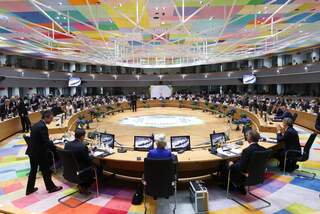
© European Union
Stronger partnerships for shared success with the Global South
In late February, EU Commission President Ursula von der Leyen travelled to New Delhi with the entire College of Commissioners to deepen the EU-India strategic partnership and accelerate negotiations for a free trade agreement, set to be finalized by the end of 2025. The EU-South Africa Summit, attended by von der Leyen and European Council President António Costa, focused on strengthening economic ties, advancing the energy transition and security and defense cooperation, as well as fostering sustainable value chains and multilateral collaboration. Further reinforcing its global engagement, the EU reached an agreement in autumn 2024 to enhance cooperation with the six countries of the GCC, including the long-awaited revival of negotiations for a trade agreement. Meanwhile, the marathon talks on the EU-Mercosur free trade agreement successfully concluded at the EU-Mercosur Summit in December 2024, marking a major milestone in economic cooperation.
Those countries have long been valued partners of both the EU and Germany. However, it is particularly notable that each relationship is evolving under unique circumstances, shaped by shifting global dynamics. The race for technological and economic dominance is intensifying. While the US has pivoted towards a more protectionist trade policy, moving away from rules-based global trade, China, at the same time, is deepening economic ties with resource-rich developing nations through the Belt and Road Initiative and BRICS+, often fostering dependencies as an alternative to Western-led development cooperation. In this rapidly changing landscape, the EU is taking decisive steps to expand and recalibrate its strategic partnerships.
Strategic partnerships with the Global South: Rethinking business and development
Strengthening cooperation with the Global South is at the heart of the BDI's international agenda. At the Asia-Pacific Conference in Delhi in October 2024, we actively advocated for the swift conclusion of a trade agreement with India. Earlier in 2024, we issued a position paper calling for a fundamental shift in development policy—one that better integrates development cooperation with foreign trade promotion, aligning both with national and European interests. To achieve this, financing instruments must be streamlined and strategically deployed, particularly to connect German technological expertise with local innovation. Additionally, European businesses should gain improved access to public development aid programs. Our action plan for the new German government includes specific economic policy recommendations for the Middle East, Latin America, Sub-Sahara Africa, and Eastern Europe.
Long-term and successful North-South cooperation hinges on key priorities: sustainable value chains, digitalization, infrastructure, workforce development, labour mobility, and the creation of efficient healthcare systems. Raw materials partnerships must also be more closely linked with development cooperation to bolster the competitiveness of European industry. Accelerating infrastructure projects under the EU Global Gateway is particularly urgent. Major connectivity initiatives, such as energy and infrastructure projects in North Africa and the India-Middle East Economic Corridor (IMEC), should be advanced with a focus on European and local expertise.
A Commitment to global fairness and presence
German industry is committed to long-term partnerships with the Global South and, as part of a united EU, seeks to establish sustainable, strategic alliances that position Europe as a reliable and competitive partner. Building trust in the EU through transparency and fairness is essential, especially in regions with different political systems. To solidify these partnerships, EU policymakers and member states must strengthen their presence through targeted economic diplomacy, high-level bilateral visits, and summits—ensuring that their engagement translates into tangible action rather than rhetoric. The key to fostering enduring cooperation lies in creating win-win opportunities with compelling offers. The most significant advantage remains access to the EU internal market—the world's second-largest economic bloc—offering unparalleled opportunities for the countries of the Global South.



